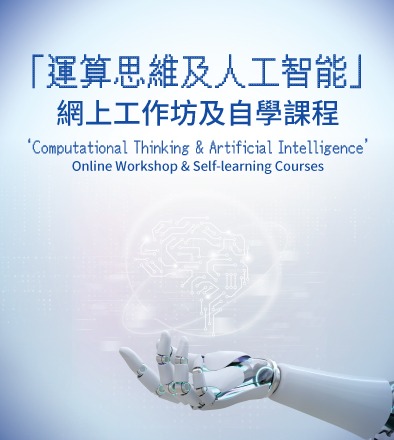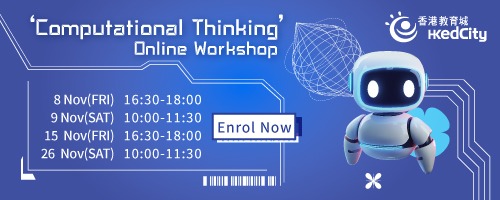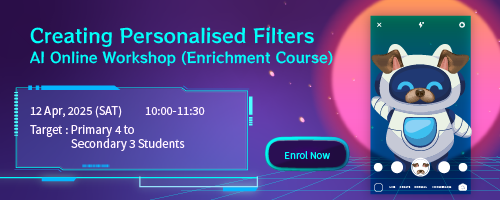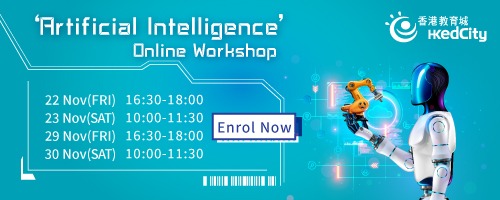

Self-learning course
In today’s digital era, computational thinking is a way of thinking that can help students understand and solve complex problems, and develop logical thinking, analytical skills, and innovative thinking. It is not just to train future scientists or engineers, but to equip all students with the problem-solving skills and creative mindset needed to thrive in the modern world. More than just computer programming, computational thinking is about how to break down problems into smaller parts, find patterns and rules, and propose effective solutions.
Programme Content
‘Computational Thinking’ Course:
- Unit 1: Introduction to Computational Thinking
- Unit 2: Computational Thinking for Problem Solving
- Unit 3: Building a Weather App Using App Inventor
- Unit 4: Computational Thinking, Visual Programming Languages and Programming Languages
‘Artificial Intelligence’ Course:
- Unit 1: Introduction to Artificial Intelligence
- Unit 2: Python Programming Crash Course – Part 1
- Unit 3: Python Programming Crash Course – Part 2
- Unit 4: Fundamentals of Machine Learning
- Unit 5: Deep Learning
- Unit 6: Natural Language Processing
- Unit 7: Computer Vision and Image Recognition
- Unit 8: Cutting-Edge Artificial Intelligence Technologies
- Unit 9: AI Ethics and Bias
Target
P4 – S3 students in Hong Kong
'Computational Thinking' Online Workshop
Overview
This series of online workshops aims to guide students in gaining an in-depth understanding of the App Inventor 2 programming tool. Throughout the course, students will progressively build a series of practical apps. The curriculum will cover various core elements of coding, such as sequences, variables, events, conditions, and operators. Students will apply what they learn by using computational thinking and coding skills to write programmes that help to solve real-life problems.
Course Outline
Part 1: 21 February (Friday) 16:30-18:00
- Review: Computational Thinking and Programming Basics
- Introduction to App Inventor 2 Interface Functions and Programming Blocks
- Learning Programming Basics: Sequences, Variables, Operators
- Hands-on Activity: BMI Calculator
Part 2: 22 February (Saturday) 10:00-11:30
- Understanding the Functions and Uses of the Canvas
- Exploring Component Properties Data, Component XY Coordinates, and Timers
- Learning Programming Basics: Events and Conditions
- Hands-on Activity: Photo Gallery App
Part 3: 28 February (Friday) 16:30-18:00
- Introduction to Translation Programs and Their Application Scenarios
- Exploring the YandexTranslate Component
- Challenge: Add Buttons for Different Language Translations, Improve the Interface of the Translation Program
- Hands-on Activity: Simple Translation Program
Part 4: 16 November (Saturday) 10:00-11:30
- Understanding Electronic Drawing Boards and the “when…Dragged” Event
- Review: Canvas Component, Events, and Conditions
- Challenge: Add Color Selection Buttons, Add a Clear Screen Button
- Hands-on Activity: Simple Drawing Board
Learning Outcomes
- Master the core elements of coding: sequences, variables, events, conditions, and operators.
- Become familiar with the interface components and functionalities of App Inventor 2 and be able to independently create simple applications.
- Utilize computational thinking to analyze and solve various real-life problems, enhancing problem-solving skills.
- Continuously optimize your applications, fostering innovative thinking and challenging yourself.
Registration
Date and Time:
21 February 2025 (Fri) 16:30-18:00
22 February 2025 (Sat) 10:00-11:30
28 February 2025 (Fri) 16:30-18:00
1 March 2025 (Sat) 10:00-11:30
Format: Zoom Livestream
Target Audience: Upper primary to junior secondary students
Language: Cantonese
Registration Fee: Free of Charge
Note: Students with an attendance rate of 75% or above will be issued an electronic certificate.
Registration:
1. For School Registration: Please complete the “Computational Thinking and Artificial Intelligence Online Workshop School Registration Form” and send to us through email.
2. For Individual Student Registration: Please register here.
Online Workshop Zoom link
The workshop will be conducted via Zoom. The zoom link and password will send to the participants’ registered email.
Overview
This series of computational thinking courses utilizes Makecode Arcade as a platform to gradually guide students in understanding the core concepts of computational thinking through engaging classroom exercises. Professional instructors will teach students the fundamental principles of computational thinking and programming, including sequencing, variables, loops, conditionals, and random number. Through practical programming mini-games, students will enhance their learning experience by applying these concepts.
Course Outline
Part 1: 8 November (Friday) 16:30-18:00
- Introduction to Computational Thinking
- Understanding Programming and Algorithms, Introduction to Sequencing
- Create a mini-game using Makecode Arcade: Whac-A-Mole
Part 2: 9 November (Saturday) 10:00-11:30
- Learning Programming Basics: Testing and Debugging, Understanding Variables and Variable Naming, Operators, Loops and Conditionals
- Design unique character sprites using the Sprite Editor
- Control character movement using controller components
- Create a mini-game: Chase the Pizza
Part 3: 15 November (Friday) 16:30-18:00
- Introduction to Flowcharts
- Learning Programming Basics: Algorithmic Thinking
- Basics of Game Design: Understanding Projectile Entities
- Create a mini-game: Happy Little Flower
Part 4: 16 November (Saturday) 10:00-11:30
- Understanding the Cartesian Coordinate System, Countdown Timers, RGB Color Concepts, and Random numbers
- Introduction to Effects: Spraying
- Create a mini-game: Lemon Leak
- Create digital artwork and share with family and friends
Learning Outcomes
- Understand the core concepts of computational thinking and their application in programming.
- Master basic programming principles, including sequencing, variables, loops, conditionals, and random numbers.
- Develop the ability to create programs and process data to solve problems.
- Enhance problem-solving skills and techniques through iterative thinking and incremental programming.
Registration
Date and Time:
8 November (Fri) 16:30-18:00
9 November (Sat) 10:00-11:30
15 November (Fri) 16:30-18:00
16 November (Sat) 10:00-11:30
Format: Zoom Livestream
Target Audience: Students ranging from upper primary to junior secondary
Language: Cantonese
Registration Fee: Free of Charge
Note: Students with an attendance rate of 75% or above will be issued an electronic certificate.
Registration:
1. For School Registration: Please complete the “Computational Thinking and Artificial Intelligence Online Workshop School Registration Form” and send to us through email.
2. For Individual Student Registration: Please register here.
'Artificial Intelligence' Online Workshop
Overview
This workshop utilises the Teachable Machine platform to help students understand the definitions and training methods of artificial intelligence and machine learning. Subsequently, students will use the p5.js platform to develop practical AI applications, creating personalised and fun filter projects to experience the joy of AI creation.
Students are required to prepare their own Windows, Mac, or Linux computers, equipped with a webcam.
Course Outline
12 April 2025 (Saturday) 10:00-11:30
- Introduction to the Teachable Machine platform and its interface
- Introduction to the p5.js platform and experiencing p5.js AI projects
- Customising facial drawing patterns and designing the filter user interface
- Adding a photo capture button and incorporating text and decorative image elements
Registration
Format: Zoom Livestream
Target Audience: Upper primary to junior secondary students
Language: Cantonese
Registration Fee: Free of Charge
Note: Students will receive an electronic certificate.
Registration:
1. For School Registration: Please complete the “12th Aprl_Artificial Intelligence Online Workshop_School Registration Form” and send to us through email.
2. For Individual Student Registration: Please register here.
Overview
This series of online workshops will review and delve into the use of artificial intelligence tools, with a focus on advanced generative AI technologies to aid in daily learning and work. Students will learn how to use free AI tools to set up an AI tutor for practicing English conversations. The workshops will also explore various generative AI tools, such as those for creating images and videos.
Course Outline
Part 1: 21 March (Friday) 16:30-18:00
- Understanding Text-Based Artificial Intelligence
- Introduction to Text Generation AI Models: Differences between ChatGPT, Assistant, etc.
- Understanding the Structure of Prompts and Prompt Engineering
- Hands-On Activity: Interviewing Newton (Creating a Personalized AI)
Part 2: 22 March (Saturday) 10:00-11:30
- Review Session: Structure of Prompts and Prompt Engineering
- Review Session: Creating Personalized AI Tools
- Advanced Techniques for POE Generative AI Platform
- Hands-On Activity: Mr. Ranedeer AI Tutor (Personalized Learning Assistant Robot)
Part 3: 28 March (Friday) 16:30-18:00
- Introduction to AI Platform – Doubao
- Differences between Doubao Platform and POE Platform
- Tutorial: Basic Interaction Methods and Real-Time Call Mode
- Hands-On Activity: English Speaking Practice AI Tutor (Custom-Made Learning Assistant Robot)
Part 4: 29 March (Saturday) 10:00-11:30
- Introduction to Runway AI Image and Video Creation Platform
- Tutorial: Image Generation Features and Text-to-Video Techniques
- Advanced Tutorial: Image-to-Video Techniques
- Hands-On Activity: Create Your Own Animated Cartoon Avatar
Learning Outcomes
- Understand the basic principles and applications of text generation AI models, including the differences between models like ChatGPT and Assistant.
- Master the structure and optimization techniques of prompts to enhance the output of AI models.
- Create personalized AI tools through hands-on activities, such as interviewing Newton and Mr. Ranedeer AI Tutor.
- Learn techniques for image generation and text-to-video creation using the Runway platform and create animated cartoon avatars.
Registration
Date and Time:
21 March 2025 (Fri) 16:30-18:00
22 March 2025 (Sat) 10:00-11:30
28 March 2025 (Fri) 16:30-18:00
29 March 2025 (Sat) 10:00-11:30
Format: Zoom Livestream
Target Audience: Students ranging from upper primary to junior secondary
Language: Cantonese
Registration Fee: Free of Charge
Note: Students with an attendance rate of 75% or above will be issued an electronic certificate.
Registration:
1. For School Registration: Please complete the “Computational Thinking and Artificial Intelligence Online Workshop School Registration Form” and send to us through email.
2. For Individual Student Registration: Please register here.
Online Workshop Zoom link
The workshop will be conducted via Zoom. The zoom link and password will send to the participants’ registered email.
Overview
This workshop will utilize the Teachable Machine platform to help students understand the definitions and training methods of artificial intelligence and machine learning. Additionally, students will integrate the P5.js platform to develop practical AI applications. They will learn how to use AI tools from the POE platform for interdisciplinary project, such as data collection and creating visual materials like logos, enabling them to design personalized AI tools tailored for various academic purposes.
Course Outline
Part 1: 22 November (Friday) 16:30-18:00
- Introduction to Generative Artificial Intelligence
- Understanding Machine Learning and the Teachable Machine platform
- Learning Image Recognition: Gesture Recognition
- AI Image Training Exercise
- Introduction to P5.js platform and experiencing AI projects
Part 2: 23 November (Saturday) 10:00-11:30
- Understanding the Operation of Xbox Kinect: Pose Recognition
- Creating Cloud Models
- Conducting AI Testing
- Introduction to JavaScript
- Create a mini-game: Motion-Sensing Snake Game
Part 3: 29 November (Friday) 16:30-18:00
- Understanding Different Types of Artificial Intelligence
- Learning to Operate the POE AI Tool Platform
- Differences Between Paid and Free AI Models
- AI Practice Activity: Data Collection AI Robot
Part 4: 30 November (Saturday) 10:00-11:30
- Understanding and Optimizing Prompts
- Creating Personalized AI Activities: Interviewing Newton
- Introduction to Generative Image AI
- AI Practice Activity 1: Developing a Weekend Trip Planning AI Robot
- AI Practice Activity 2: Assisting in Designing Practice Questions AI Robot
- Understanding Ethical Guidelines for AI Use
Learning Outcomes
- Understand the basic concepts and definitions of artificial intelligence and machine learning.
- Integrate programming knowledge with other disciplines to flexibly apply solutions to real-life problems.
- Enhance self-directed learning and exploration skills, encouraging the design of innovative and personalized AI tools.
Registration
Date and Time:
22 November (Fri) 16:30-18:00
23 November (Sat) 10:00-11:30
29 November (Fri) 16:30-18:00
30 November (Sat) 10:00-11:30
Format: Zoom Livestream
Target Audience: Students ranging from upper primary to junior secondary
Language: Cantonese
Registration Fee: Free of Charge
Note: Students with an attendance rate of 75% or above will be issued an electronic certificate.
Registration:
1. For School Registration: Please complete the “Computational Thinking and Artificial Intelligence Online Workshop School Registration Form” and send to us through email.
2. For Individual Student Registration: Please register here.
PICCK scoring system
| Innovation and Creativity | Communication and Collaboration | |
| Participate in a Zoom workshop | ✓ | ✓ |
Enquiries
About the workshop:
mimi.lee@hkecl.net
2624 1029
For technical support:
info@edcity.hk




